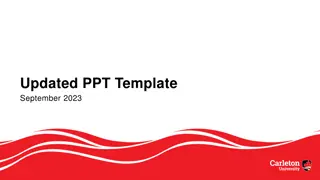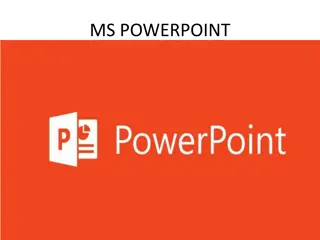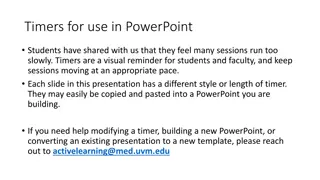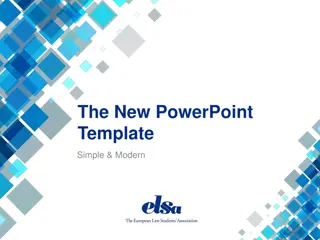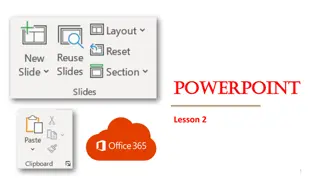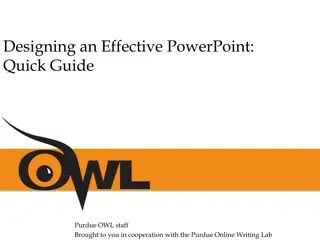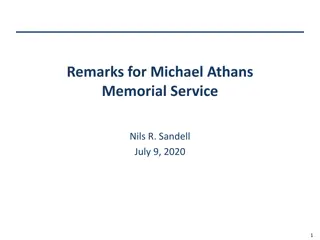Insurance Seminar for Design Professionals - April 2022
Join the April 2022 Professional Underwriters, Inc. seminar featuring Michael D. Simmons from Bond & Specialty Insurance as he discusses insurance insights for design professionals. Learn about additional insurance options, indemnity clauses, and how to handle being sued. Contact Brett Coleman and Lynda West from Travelers for expert advice on Professional Liability (PL) and Commercial General Liability (GL) coverage.
Download Presentation

Please find below an Image/Link to download the presentation.
The content on the website is provided AS IS for your information and personal use only. It may not be sold, licensed, or shared on other websites without obtaining consent from the author. Download presentation by click this link. If you encounter any issues during the download, it is possible that the publisher has removed the file from their server.
E N D
Presentation Transcript
April 2022 Professional Underwriters, Inc. Seminar for Design Professionals Michael D. Simmons Claim Counsel I Bond & Specialty Insurance I Design Professionals
Disclaimer The views expressed in these materials are those of the author and do not necessarily reflect the views of The Travelers Companies, Inc. or any of its subsidiary insurance companies ( Travelers ). This material is for general informational purposes only and is not legal advice. It is not designed to be comprehensive, and it may not apply to your particular facts and circumstances. Consult as needed with your own attorney or other professional adviser. This material does not amend, or otherwise affect, the provisions of any insurance policy issued by Travelers. It is not a representation that coverage does or does not exist for any particular claim or loss under any such policy. Coverage depends on the facts and circumstances involved in the claim or loss, all applicable policy provisions, and any applicable law. Availability of coverage referenced in this document can depend on underwriting qualifications and state regulations. Claims scenarios are based on actual claims, composites of actual claims, or hypothetical situations. Resolution amounts are approximations of both actual and anticipated losses and defense costs. Facts may have been changed to protect confidentiality.
Speaker Bio Michael D. Simmons is a Claim Counsel in the Bond & Specialty Insurance /Design Professionals Group with Travelers. He was a Partner in the Litigation Section of a Chicago based law firm specializing in aviation and insurance defense. Michael also worked as an in-house trial attorney for a Chicago General Liability Insurance company. After 12 years as trial attorney, he changed careers and entered the Professional Liability insurance line of business. Michael has worked for professional liability insurance carriers handing design professional claims in the US, Canada and the UK. He has also provided risk management services and continuing education seminars for design professionals for over 25 years. His territory is throughout the US with a focus in the Midwest and Southwest regions. Michael is a graduate of Valparaiso University and Drake University School of Law.
Agenda Insurance for the Design Professional. Is there Additional Insurance status for Design Professionals? Indemnity Clauses in Design Professional contracts. I m being sued what do I do now?
Insurance for the Design Professional Professional Liability (PL) Commercial General Liability (GL) Contact Brett Coleman and or Lynda West (Travelers) for information about the right insurance coverage for your business.
Additional Named Insured What is an Additional Insured? A: An Additional Named Insured is a person or entity who by the project contract is added to an insurance policy who is not the Named Insured on that policy.
Additional Named Insured What is the benefit to being added as an Additional Named Insured? A: You may be afforded insurance coverage without having to pay the insurance premium for a policy that may provide you with a defense and/or indemnity.
Additional Named Insured What language do I look for in my project contract to spot an Additional Named Insured obligation? Design Professional shall furnish an endorsement that names Client as an Additional Insured on all insurance policies without limitation. Contractor shall purchase insurance set forth in Exhibit A, including naming the Owner as an Additional Named Insured on all insurance policies. Contractor must provide a Certificate of Insurance evidencing compliance.
Additional Named Insured Can I add my client, the contractor or the owner to my Professional Liability (PL) Policy as an Additional Named Insured? A: No.PL policies generally provide coverage only for a Named Insured which is only you/and or your company. If you agree to name any other party to your PL insurance policy, that agreement is not binding upon your insurance company.
Additional Named Insured What happens if I agree to add my client as an Additional Named Insured on my Professional Liability (PL) Policy? A: Generally, PL policies exclude liability assumed by contract which is not required under law. PL insurance companies have no obligation to provide insurance coverage to a party whom you add as an Additional Named Insured.
Additional Named Insured Consequences: If a Claim is made against you, part of that claim may include damages including attorney s fees and costs a party incurs as a result of not being Named as an Additional Named Insured on your Professional Liability Policy. Your Professional Liability Policy may not provide coverage for attorney s fees and expenses.
Indemnity Clauses Your client may demand, as a condition of your professional services agreement, that you indemnify them for any damages, losses and expenses occurring on a project.
Indemnity Clauses - Definition What does it mean to indemnify ? A: To compensate (someone) for harm or loss.
Indemnity Clauses - Definition To indemnify another party is to compensate that party for losses that that party has incurred or will incur as related to a specific incident*. *Cornell Law School, Legal Information Institute, https://www.law.cornell.edu/wex/indemnify
Indemnity Clauses Why do we care about Indemnity Clauses?
Indemnity Clauses Liability: Under law, you are legally liable for damages caused as a direct consequence of your negligent acts or omissions. But indemnification provisions may require that you assume the obligation to pay losses of another beyond your legal liability. Provisions requiring that you indemnify for claims arising from the performance of your services or your contract without any negligence on your part expand your responsibility for losses for which you would have no responsibility, absent the indemnification provision.
Indemnity Clauses Defense: Your client may require that you indemnify them for liability caused by your negligent acts or omissions, and also that you defend them in the event that a claim is made that alleges you are negligent. The obligation to defend may require you to retain and pay for an attorney. You should reject any obligation in your contract to defend, as your professional liability insurance will not provide a defense to a third party.
Indemnity Clauses Enforceability: Some states have enacted statutes that limit or prohibit the enforceability of indemnity provisions. Be sure to have an attorney check the state laws governing your contract to determine if the indemnity provision is enforceable. Even if you think that the indemnity you are agreeing to may not be enforceable under state law, make sure you negotiate the language to be as limited as possible.
Indemnity Clauses Points to Consider When entering into a contract with your client, do your best to limit the number of indemnities. You must know specifically who you are indemnifying to quantify your risk. Examine with care precisely what you are being asked to pay for. Beware of indemnities that make you responsible for any and all claims, of every kind and nature, related to the project. Negligence: If you must accept an indemnification provision, your obligation to pay should be triggered by your negligent acts or omissions in performing your professional services.
Indemnity Clause Poor Example Design Professional shall defend, indemnify and hold harmless the owner, its subsidiaries and authorized persons with respect to any demand, claim, liability, costs, expenses, fines or penalties of any kind and in any way related to the Project or this Agreement including attorney s fees, costs and expenses.
Indemnity Clause Better Example Client and Design Professional, to the extent permitted by applicable law, shall each indemnify the other with respect to any demand, claim, liability, costs, expenses, fines or penalties to the extent caused by such Party s negligent act, error or omission in any way related to the Project or this Agreement. In the event of any claim, allegation or demand by any third party involving the negligent performance of the scope of services or responsibilities of either Party, such Party shall promptly assume responsibility for the investigation, defense and response to such issues.
Indemnity Clause Summary They should be written to be clear, concise language. Limit the number and type of parties to be indemnified. Delete any obligation to defend. Delete any reference to pay for attorney s fees and expenses unless allowed by state law. Should berelated the extent caused by your negligent act, error or omission related to the project.
I am being sued! Now what? Receiving a Summons and a lawsuit from a process server or through the US mail can be unnerving and be the cause of anger, frustration and sleepless nights.
When to Report a Pre-Claim or a Claim You should report a potential claim or a claim as soon as possible to your insurance broker Brett Coleman and his team at Professional Underwriters, Inc who will notify Travelers.
What is a Claim? Travelers Professional Liability Policy defines a Claim as follows: Travelers Professional Liability Policy defines a Claim as follows: Claim means: 1. 2. complaint or similar pleading; or 3. a written request to toll or waive a statute of limitations relating to a potential civil or administrative proceeding, against any Insured for a Wrongful Act. a demand for moneyor services; a civil proceeding commenced by service of a
A Typical Claim Cycle Notice to the insurance carrier. From the broker (i.e., Brett Coleman), or From the Named Insured directly. Assignment to the Claim Professional. Claim Professional verifies an active Policy for the Named Insured, reviews Policy Endorsements and sets up a file. Contact with Named Insured. Investigation of facts and the project. Implement strategy for resolution of the claim. Acknowledgment letter is emailed to the Named Insured with a copy to the broker. Advise Named Insured of the insurance carrier s position regarding coverage for the claim tendered to it.
A Typical Claim Cycle The Claims Professional will assist the Named Insured as needed or assign an attorney to provide assistance or a defense. At 60 days from an assignment by Travelers, claims in litigation require the defense attorney to provide an Initial Claim Report to the Claims Professional with a copy to you. The Claims Professional, the Named Insured and Defense Counsel conference at various intervals to discuss the defense plan, retention of experts and options for resolution of the claim. Direct negotiation with the claimant or mediate the claim for resolution. Arbitration or Trial if necessary.
Litigation Hold Letter You may receive a Litigation Hold letter in advance of being sued. This is a written correspondence directing an entity or an individual to preserve documents which could become evidence in litigation. These letters usually require the preservation of electronic correspondence, documents, spreadsheets, paper documents or other data.
Litigation Hold Letter The obligation to preserve evidence begins when a party knows or should have known that the evidence is relevant to future or current litigation. In some cases, the failure to retain evidence has resulted in a legal presumption that any evidence not retained would be adverse the party which failed to retain that evidence. That failure to retain evidence can cripple your defense.
Questions Thank You.



